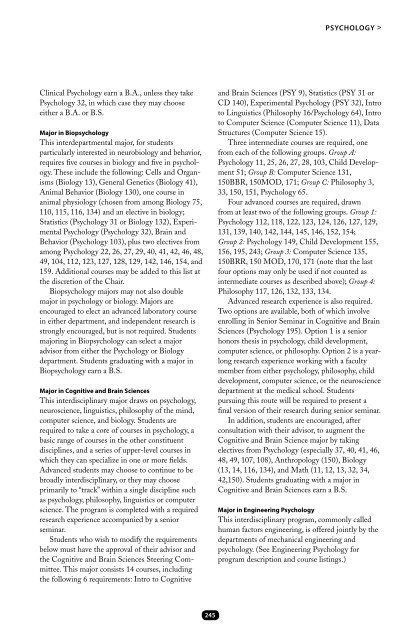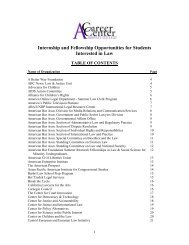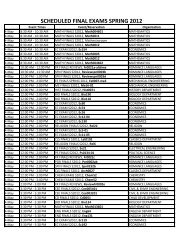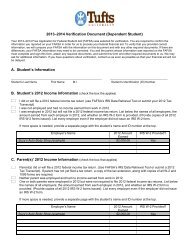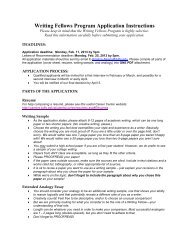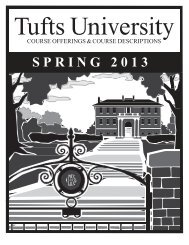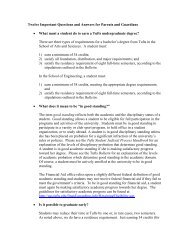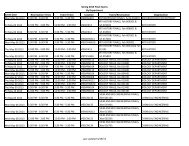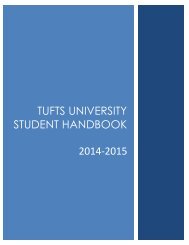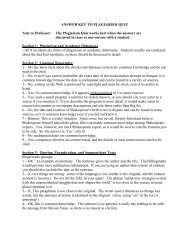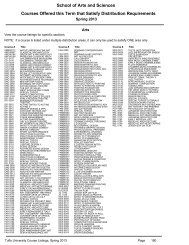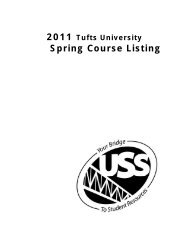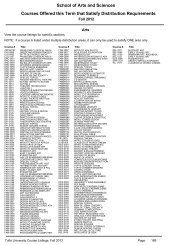2013â2014 The Bulletin - USS at Tufts - Tufts University
2013â2014 The Bulletin - USS at Tufts - Tufts University
2013â2014 The Bulletin - USS at Tufts - Tufts University
You also want an ePaper? Increase the reach of your titles
YUMPU automatically turns print PDFs into web optimized ePapers that Google loves.
Psychology ><br />
Clinical Psychology earn a B.A., unless they take<br />
Psychology 32, in which case they may choose<br />
either a B.A. or B.S.<br />
Major in Biopsychology<br />
This interdepartmental major, for students<br />
particularly interested in neurobiology and behavior,<br />
requires five courses in biology and five in psychology.<br />
<strong>The</strong>se include the following: Cells and Organisms<br />
(Biology 13), General Genetics (Biology 41),<br />
Animal Behavior (Biology 130), one course in<br />
animal physiology (chosen from among Biology 75,<br />
110, 115, 116, 134) and an elective in biology;<br />
St<strong>at</strong>istics (Psychology 31 or Biology 132), Experimental<br />
Psychology (Psychology 32), Brain and<br />
Behavior (Psychology 103), plus two electives from<br />
among Psychology 22, 26, 27, 29, 40, 41, 42, 46, 48,<br />
49, 104, 112, 123, 127, 128, 129, 142, 146, 154, and<br />
159. Additional courses may be added to this list <strong>at</strong><br />
the discretion of the Chair.<br />
Biopsychology majors may not also double<br />
major in psychology or biology. Majors are<br />
encouraged to elect an advanced labor<strong>at</strong>ory course<br />
in either department, and independent research is<br />
strongly encouraged, but is not required. Students<br />
majoring in Biopsychology can select a major<br />
advisor from either the Psychology or Biology<br />
department. Students gradu<strong>at</strong>ing with a major in<br />
Biopsychology earn a B.S.<br />
Major in Cognitive and Brain Sciences<br />
This interdisciplinary major draws on psychology,<br />
neuroscience, linguistics, philosophy of the mind,<br />
computer science, and biology. Students are<br />
required to take a core of courses in psychology, a<br />
basic range of courses in the other constituent<br />
disciplines, and a series of upper-level courses in<br />
which they can specialize in one or more fields.<br />
Advanced students may choose to continue to be<br />
broadly interdisciplinary, or they may choose<br />
primarily to “track” within a single discipline such<br />
as psychology, philosophy, linguistics or computer<br />
science. <strong>The</strong> program is completed with a required<br />
research experience accompanied by a senior<br />
seminar.<br />
Students who wish to modify the requirements<br />
below must have the approval of their advisor and<br />
the Cognitive and Brain Sciences Steering Committee.<br />
This major consists 14 courses, including<br />
the following 6 requirements: Intro to Cognitive<br />
and Brain Sciences (PSY 9), St<strong>at</strong>istics (PSY 31 or<br />
CD 140), Experimental Psychology (PSY 32), Intro<br />
to Linguistics (Philosophy 16/Psychology 64), Intro<br />
to Computer Science (Computer Science 11), D<strong>at</strong>a<br />
Structures (Computer Science 15).<br />
Three intermedi<strong>at</strong>e courses are required, one<br />
from each of the following groups. Group A:<br />
Psychology 11, 25, 26, 27, 28, 103, Child Development<br />
51; Group B: Computer Science 131,<br />
150BBR, 150MOD, 171; Group C: Philosophy 3,<br />
33, 150, 151, Psychology 65.<br />
Four advanced courses are required, drawn<br />
from <strong>at</strong> least two of the following groups. Group 1:<br />
Psychology 112, 118, 122, 123, 124, 126, 127, 129,<br />
131, 139, 140, 142, 144, 145, 146, 152, 154;<br />
Group 2: Psychology 149, Child Development 155,<br />
156, 195, 243; Group 3: Computer Science 135,<br />
150BRR, 150 MOD, 170, 171 (note th<strong>at</strong> the last<br />
four options may only be used if not counted as<br />
intermedi<strong>at</strong>e courses as described above); Group 4:<br />
Philosophy 117, 126, 132, 133, 134.<br />
Advanced research experience is also required.<br />
Two options are available, both of which involve<br />
enrolling in Senior Seminar in Cognitive and Brain<br />
Sciences (Psychology 195). Option 1 is a senior<br />
honors thesis in psychology, child development,<br />
computer science, or philosophy. Option 2 is a yearlong<br />
research experience working with a faculty<br />
member from either psychology, philosophy, child<br />
development, computer science, or the neuroscience<br />
department <strong>at</strong> the medical school. Students<br />
pursuing this route will be required to present a<br />
final version of their research during senior seminar.<br />
In addition, students are encouraged, after<br />
consult<strong>at</strong>ion with their advisor, to augment the<br />
Cognitive and Brain Science major by taking<br />
electives from Psychology (especially 37, 40, 41, 46,<br />
48, 49, 107, 108), Anthropology (150), Biology<br />
(13, 14, 116, 134), and M<strong>at</strong>h (11, 12, 13, 32, 34,<br />
42,150). Students gradu<strong>at</strong>ing with a major in<br />
Cognitive and Brain Sciences earn a B.S.<br />
Major in Engineering Psychology<br />
This interdisciplinary program, commonly called<br />
human factors engineering, is offered jointly by the<br />
departments of mechanical engineering and<br />
psychology. (See Engineering Psychology for<br />
program description and course listings.)<br />
245


